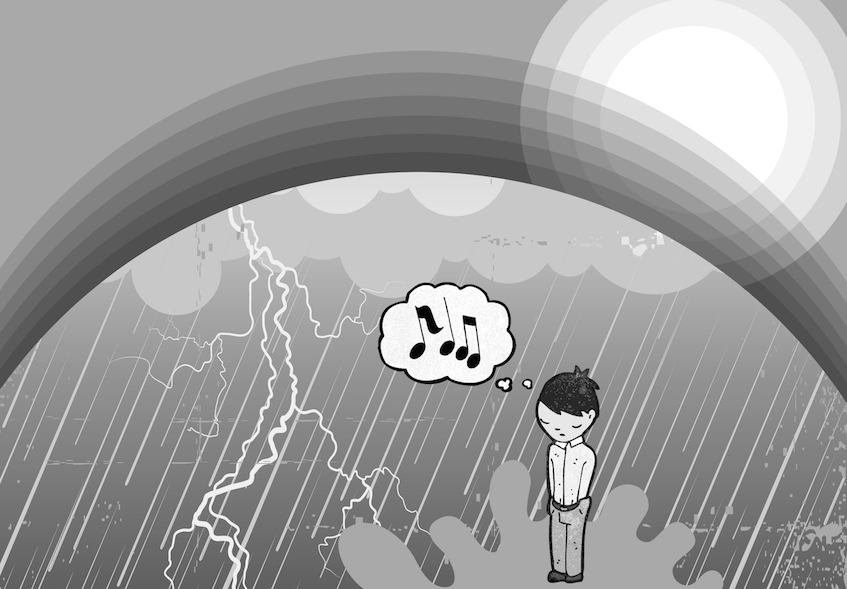Print Edition: July 1, 2015
I used to blame my mood on the weather. I feel lousy when it’s dark and grey. In winter, school and work stress pile up, friends are busy, and the activities I enjoy most aren’t an option.
It wasn’t until recently that I realized depression is so much more than cloudy days — clouds blow over.
There’s a history of mental health issues in both sides of my family, namely bi-polar disorder and depression, and it’s not surprising I would inherit them. Every so often, I catch myself falling into the pattern of what I used to think was only seasonal depression.
It creeps up on me in small ways. Sleeping and eating more, crying, cancelling on friends at the last minute, and watching lots of stand-up comedy to try to cheer up are all symptoms that tell me I’m not feeling quite up to speed.
I try to pull myself out by imagining enjoyable things I can do, but none of it appeals to me. I feel hopeless. I feel somehow worse for being “lazy.” I don’t feel like it’s a chemical imbalance; I feel like it’s the universe telling me I’m not worth being here.
I’ve been to counsellors. I’ve been to a psychologist and a psychiatrist. I tried anti-depressants. None of these treatments worked for me. After years of trying traditional methods, I came up with my own coping mechanisms instead.
I do not struggle with depression as severely as others. Mine comes and goes, and has never gone as far as attempting suicide. There are people who are completely immobilized by depression, and I encourage you to seek professional help if so — seeing a professional didn’t make everything go away in my case, but it didn’t hurt, either.
That said, there are three ways I fight depression, no matter the season.
Be sad
Recently I’ve started giving myself permission to feel sad.
I’m the type that puts on a smile and tries to expel as much positive energy into the world as I can. I tend to cover up my sadness with over-enthusiasm and happiness in an attempt to “get over it” or “take the high road.” Although being positive is more socially acceptable — a mask that lets me pretend I’m a well-adjusted and confident person — I don’t recommend it as a long-term solution. People can tell when I’m faking it. They sense it, and I think it makes them assume I’m some kind of crazy sociopath.
I’d rather they think I’m depressed than a sociopath. When I’m having a bad day or when I’m feeling stressed out, I acknowledge it. I let myself give an honest answer to the question, “How are you?”
You would be surprised how well people can cope with the truth.
Be lazy
The next thing I do is fairly easy: I do the bare minimum. I go to my appointments that week and I do what is necessary to get my job done. I let myself spend my spare time alone watching comedy videos. At social gatherings, I run to the bathroom when I need a breather away from people. I don’t offer to do extra work and I don’t say yes to more parties or outings than I want to.
Doing the bare minimum gives me a tiny sense of accomplishment. Instead of covering up depression and distracting myself with new projects, I’ve tried just doing what I need to get by. For me, this works wonders. When I have a cold or the stomach flu, I don’t start training for a triathlon. Why should I treat other forms of sickness any differently? I’ve found that honouring what you’re feeling and taking the time to care for yourself helps you get through depression faster.
Be kind
This is the most challenging piece of advice and I still haven’t mastered it. Depression makes some people moody and angry, like an angry lion howling over a thorn in its paw. I find myself giving my parents one-word answers, and becoming easily upset with small problems. One time, I cried because I had to restart my computer.
It helps to be nice. Start small; send kind texts to friends wondering how they’re doing. You might notice a difference when you shift the focus away from yourself and at least observe what others are doing.
I work my way up to doing nice things for people. Sometimes I’m feeling okay enough to clean the garage for my dad, or help a colleague finish a project.
It’s not about feeling good about yourself for doing a nice thing. It’s about moving your brain into autopilot and easing yourself into social interactions again. It’s so difficult to get up and do things when you’re depressed. It’s difficult to imagine yourself happy. But for some reason, I can still imagine other people being happy. Knowing that my colleague needs my help or that my dad will be pleased makes me feel better about sometimes not feeling anything.
In my case, using these small tricks helps me get over what I’m feeling — like taking a Tylenol when I have a headache. They are short-term solutions, and if you’re feeling chronic pain, please consult your doctor. But if you’re like me and you occasionally suffer from the winter (or summer) blues, try them. You just might find yourself feeling a bit better.



